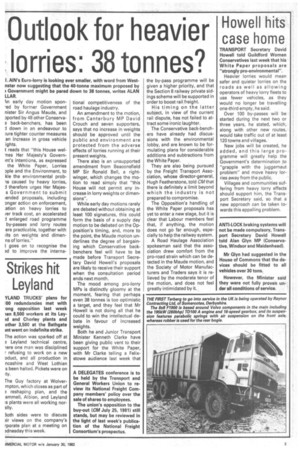Outlook for heavier lorries: 38 tonnes?
Page 3

If you've noticed an error in this article please click here to report it so we can fix it.
I .AIN's Euro-lorry is looking ever smaller, with word from Westnster now suggesting that the 40-tonne maximum proposed by Government might be pared down to 38 tonnes, writes ALAN LLAR.
s,n early day motion sooned by former Government nister Sir Angus Maude, and pported by 48 other Conservea back-benchers, has been down in an endeavour. to ;ure tighter counter measures an increase in gross vehicle ights.
t reads that "this House wellies Her Majesty's Governint's intentions, as expressed the White Paper, Lorries ople and the Environment, to kle the environmental probis caused by heavy lorries, therefore urges Her Majes s Government to submit !ended proposals, including onger action on enforcement, :ation on heavy lorries to rer track cost, an accelerated enlarged road programme by-passes and lorry routes ere practicable, together with its on weights and dimenns of lorries."
t goes on to recognise the ad to improve the interne tional competitiveness of the road haulage industry.
An amendment to the motion, from Canterbury MP David Crouch and seven supporters, says that no increase in weights should be approved until the public and environment are protected from the adverse effects of lorries running at their present weights.
There also is an unsupported amendment from Beaconsfield MP Sir Ronald Bell, a rightwinger, which changes the motion to read simply that "this House will not permit any increase in lorry weights or dimensions".
While early day motions rarely are debated without obtaining at least 100 signatures, this could form the basis of a supply day motion to be debated on the Opposition's timing, and, more to the point, the Maude motion underlines the degree of bargaining which Conservative backbenchers feel will have to be made before Transport Secretary David Howell's proposals are likely to receive their support when the consultation period ends next month.
The mood among pro-lorry MPs is distinctly gloomy at the moment, fearing that perhaps even 38 tonnes is too optimistic a target, and they feel that Mr Howell is not doing all that he could to win the intellectual debate in favour of increased weights.
Both he and Junior Transport Minister Kenneth Clarke have been giving public vent to their support for the White Paper, with Mr Clarke telling a Felixstowe audience last week that the by-pass programme will be given a higher priority, and that the Section 8 railway private sidings scheme will be supported in order to boost rail.freight.
His timing on the latter subject, in view of the current rail dispute, has not failed to attract some ironic laughter.
The Conservative back-benchers have already had discussions with the environmental lobby, and are known to be formulating plans for considerable additions and subtractions from the White Paper.
They are also being pursued by the Freight Transport Association, whose director-general, Hugh Featherstone, told CM that there is definitely a limit beyond which the industry is not prepared to compromise.
The Opposition's handling of the White Paper proposals has yet to enter a new stage, but it is clear that Labour members feel that, if anything, the motion does not go far enough, especially to help the railway system.
A Road Haulage Association spokesman said that the association drew comfort from the pro-road strain which can be detected in the Maude motion, and the Society of Motor Manufacturers and Traders says it is relieved by the moderate tenor of the motion, and does not feel greatly intimidated by it.
























































